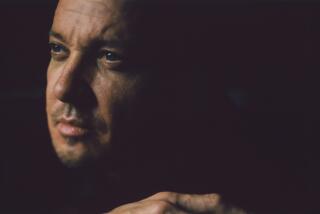Man of Steel
- Share via
In Dalton Trumbo’s novel “Johnny Got His Gun,” the narrator, a soldier catastrophically wounded in World War I, tries to tell the world about war’s horrors, but the narration is all in his mind. Legless, armless, blind and mute, he can communicate only by thumping the back of his head on the pillow of his hospital bed in a pattern that a nurse finally recognizes as Morse code.
Actor Christopher Reeve, paralyzed from the neck down in a fall from a steeplechase horse in Culpeper, Va., on Memorial Day 1995, has a somewhat easier time conveying his message: that life can be meaningful even for people who are unable to move and are totally dependent, but that America needs to do more for its quarter million victims of spinal-cord injury, most of whom aren’t movie stars with private wealth and powerful friends.
Reeve can, and does, speak out. At the 1996 Democratic National Convention, he said “family values” properly means that Americans are “all family. . . . [W]e all have value.” He lobbied a Senate Appropriations subcommittee last year for greater spending on medical research. His Christopher Reeve Foundation raises millions of dollars for the American Paralysis Assn.’s efforts to find a cure for spinal-cord injury. He can, and does, stay involved in the film industry, directing an HBO drama, “In the Gloaming,” that was nominated for five Emmys in 1997. And, thanks to a voice-operated computer, he has written this book.
“Still Me” is really two books in one. Half of it is a standard Hollywood memoir--the story of Reeve’s swift and seemingly smooth ascent from a moneyed, if not always happy, East Coast background to a film-school friendship with Robin Williams, a Broadway role opposite Katharine Hepburn and stardom in four “Superman” movies. We read this, however, in light of the other half: an excruciatingly detailed account of Reeve’s injury and convalescence. Reading the account of Reeve’s many successes is like watching the first 90 minutes of “Titanic,” waiting for the iceberg.
Reeve had more resources with which to construct a new life as a quadriplegic than most. The energy he brought to the stage and screen, to riding, sailing, flying and political advocacy--including his defense of the National Endowment for the Arts and of victims of the Pinochet dictatorship in Chile--was energy he could use to battle his fear “that I was going to be a huge burden to everybody, that I had ruined my life and everyone else’s.”
Suicide, he says, was no longer an option after his wife, Dana, assured him when he regained consciousness: “You’re still you. And I love you.” He had three children to live for. And, to Reeve’s credit, he was uneasy about the advantage his celebrity gave him in securing the costly, labor-intensive care a quadriplegic needs. He has tried to justify his continued existence by working for those who, like Trumbo’s anonymous doughboy, lack any such edge.
Reeve says he expects to walk again. Preparing for a medical breakthrough he believes to be just around the corner, he keeps his muscles toned with electronic stimuli. He holds painful memories of the past at bay: “I know how to do it now: I have to take the key to acting and apply it to my life. There is no other way to survive except to be in the moment.” This strategy is clearly necessary for him, but it detracts from the drama of an otherwise inspiring story. Though Reeve talks about despair, he seldom makes us feel it. Even flat on his back, he’s too much the Man of Steel to let the Kryptonite of the soul weaken him for long.
More to Read
Sign up for our Book Club newsletter
Get the latest news, events and more from the Los Angeles Times Book Club, and help us get L.A. reading and talking.
You may occasionally receive promotional content from the Los Angeles Times.








